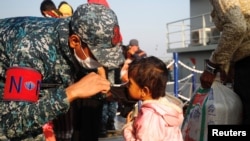The U.N. refugee agency warns a severe shortage of COVID-19 vaccines in Asia-Pacific is putting the lives of refugees and asylum seekers at risk as this deadly disease continues to spread like wildfire throughout the region.
These countries have pledged to include refugees and asylum seekers into their COVID-19 vaccination programs. However, there are not enough vaccines to go around, so marginalized groups are among the last to benefit from these schemes. In the past two months, the World Health Organization has recorded some 38 million COVID-19 cases and more than half a million deaths in the Asia-Pacific region, the largest increase globally.
UNHCR reports refugees who live in overcrowded, unsanitary settings are especially vulnerable to the spread of COVID-19. Spokesman Andrej Mahecic says there has been a huge increase in the number of cases among Rohingya refugees in Cox’s Bazar, Bangladesh since April. He notes nearly 900,000 refugees are living in this densely populated camp, the largest in the world.
"As of 31 May, there have been over 1,188 cases confirmed among the refugee population, with more than half of these cases recorded in May alone," said Mahecic. "We have also seen a worrying increase in the number of COVID-19 cases among refugees and asylum-seekers in Nepal, Iran, Pakistan, Thailand, Malaysia and Indonesia.”
Even as much of the world appears to be recovering from the pandemic, aid agencies report fragile health systems in many countries in the region are struggling to cope with the recent surge of cases. They say help is needed to address the scarcity of hospital beds, oxygen supplies and other essential health facilities and services.
Mahecic says efforts are under way to mitigate the spread of the virus, but preventive measures must be bolstered with intensified vaccinations. He says some refugees, including in Nepal, have received their first vaccine dose with supplies provided by WHO’s COVAX vaccination-sharing facility.
"Among the Rohingya refugees in camps in Bangladesh, not a single vaccine has been administered yet given the scarcity of supplies in the country," said Mahecic. "The current delays in vaccine shipments, brought about by limited supplies to COVAX, mean that some of the world’s most vulnerable people remain susceptible to the virus.”
The UNHCR is appealing for equitable access to COVID-19 vaccines to save lives and curb the devastating impact of the virus in the Asia-Pacific region. It is urging the wealthier countries to donate surplus doses to COVAX for distribution in the poorer countries.




